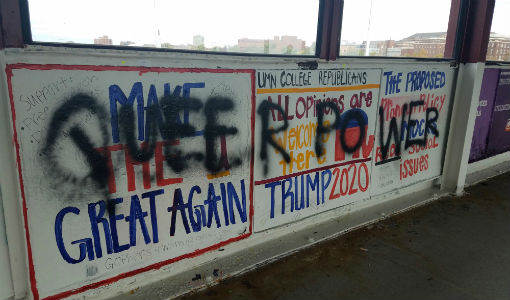Overview
Universities nationwide have experienced a marked rise in reports of hateful expression since 2016, including racist screeds, hate-motivated violence, and white supremacist propaganda. Although some people may feel anger, resentment, frustration, or discouragement in response to hateful speech, those feelings alone are not sufficient grounds to limit that speech. Universities must take situations involving hateful expression seriously, and should encourage more speech in response to them, rather than censorship.
See resources by role:
The Law
Hateful speech is protected by the First Amendment and has long been cited as such by the United States Supreme Court. The United States adheres to the principle that the solution to offensive speech is more speech, so long as the speech does not incite immediate violence. For the purposes of data collection, the FBI defines hate crimes as “criminal offense[s] against a person or property motivated in whole or in part by an offender’s bias against a race, religion, disability, sexual orientation, ethnicity, gender, or gender identity.” Hate crimes differ from “hate speech” in that all hate crimes are punishable criminal acts that are treated with priority by the federal government due to their extreme impact on groups and society. Other situations require college and university officials to consider if speech crosses the line into discrimination and harassment, as dictated by federal statures. See Hateful Language & Offensive Speech and Federal Statutes in the Law section.
Our Principles
- Hateful speech that is intended to menace, intimidate or discriminate against an individual based upon a personal characteristic or membership in a group can impair equal access to the full benefits of a college education and the ability of all students to participate in campus discourse.
- In an environment of rising incidences of hateful speech and hate crimes nationally, the potency of individual instances of hateful speech on campus can be heightened, increasing the psychological harm that such speech can cause and underscoring the importance of effective institutional responses.
- That some individuals may experience offense or insult or negative feelings such as anger, resentment, frustration, or discouragement in response to others’ speech is not sufficient grounds to limit that speech, because by its nature speech frequently does give rise to such feelings.
- Conflating the expression of controversial or even offensive viewpoints with hateful speech can result in the suppression of open discourse and trigger a backlash from groups whose expression is deterred or punished despite not being intentionally hateful.
- Administrators have an imperative to be responsive to threats, hateful intimidation, and students’ encounters with overt racism and other forms of discrimination. This responsiveness is imperative to nurturing an environment where all feel empowered to participate in the free exchange of ideas and opinions.
- Effective responses to hateful speech include counter-messaging, condemnations, direct support to targeted individuals and groups, dialogue, and education. In the case of hate crimes, harassment and any other conduct that violates the law, aggressive disciplinary response is warranted.

